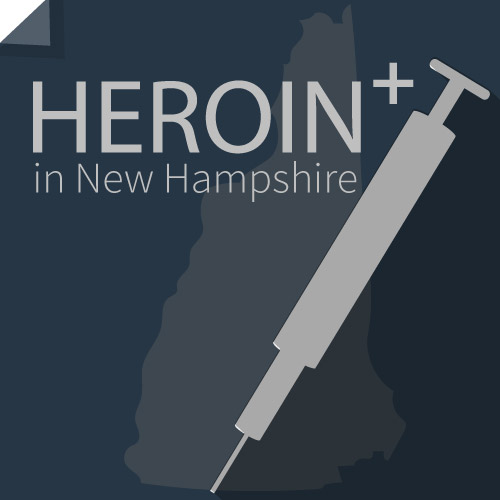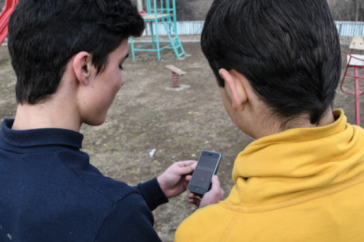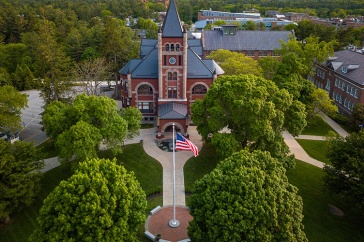
This is the fifth article in our series exploring how UNH alumni, faculty and students are tackling the heroin and opioid epidemic that has hit New Hampshire and many other parts of the country.
This story takes a look at filmmaker Michael Venn ’96 who is working on the documentary “Community Is Greater Than Heroin,” which he began last year as overdose deaths reached their highest peak ever.
With his longish hair and goatee, black leather jacket and aviator sunglasses, filmmaker Michael Venn has a Johnny Depp look about him. Sitting in a Portsmouth coffee shop, he glances around at the older couple behind him, the businessman working on his laptop, a woman dressed for the gym.
“If you asked someone who in here might be a heroin addict, they’d probably think it’d be me,” Venn ’96 says, “but today it’s more likely to be the guy wearing a tie or the woman pushing a stroller. The image of what we think addicts look like is gone.”
The Portsmouth filmmaker is right. Among the almost 300 New Hampshire residents who lost their lives to drug overdoses so far this year were a college grad with a degree in chemistry, a nurse’s aide, a bank manager and a mother of four. The lucky ones — those whose addiction hasn’t won out — are equally innocuous: a former high school dropout who now has a master’s degree in social work and a woman who is working to start a recovery center in Portsmouth. Both appear in Venn’s documentary, “Community Is Greater Than Heroin.”

The film strives to bring awareness to the opioid epidemic that stole the lives of 321 New Hampshire residents in 2014, a number the state medical examiner has predicted will be surpassed this year. New Hampshire is second-to-last in the country when it comes to finding treatment for drugs and alcohol; people in need of inpatient care or detox can spend months waiting for a bed.
“This was someone who was smart, good-looking, well-off — someone you’d want to set your daughter up with. You would never once look at him and think he was a drug addict.”Venn began shooting the documentary almost a year ago after running into an old friend who confessed he was a heroin addict working to stay clean. At that point he’d been in recovery for 11 months.
“This was someone who was smart, good-looking, well-off — someone you’d want to set your daughter up with,” Venn says. “You would never once look at him and think he was a drug addict.”
That’s the phrase he has heard over and over during the process of making the film that he hopes will get —and keep — people talking about addiction.
“Take a room full of people and ask how many have been affected in any way by addiction. Nearly everyone will raise their hand,” Venn says, adding that his producer, Karlina Lyons, lost a sister to heroin. “It’s one degree of separation.”
So far, Venn, who has degrees in communication and psychology, has filmed recovering addicts as well as law enforcement officials, the state medical examiner, local and national politicians and people who work in the field of substance abuse. What the documentary won’t show is bags of heroin or needles or addicts shooting up. “I want the message to be one of hope,” Venn says.
His goal is to release “Community Is Greater Than Heroin” during election time as a way to raise even greater awareness about the crisis. Filming should wrap up soon, and once the editing is done, Venn plans to submit his documentary to film festivals around the country.
The father of an 11-year-old boy, Venn says he wants his son to grow up in a safe place, adding that if this were Miami, where Venn spent his youth, instead of picturesque New Hampshire, he’d be less surprised. And yet, the fact that the state rates among the top 10 for drug abuse simply underscores what he said in the beginning: The image is gone. Today, anyone anywhere can be a heroin addict.
“Once we start to treat addiction like the disease that it is — once we start putting our money and efforts into prevention, treatment and recovery and providing addicts with the help they need to become productive members of society where they are no longer punished and stigmatized, then we’ll start making headway,” says Venn. “It's time to reevaluate our policies on a political and social level and realize that we can't arrest our way out of the epidemic and that shame and stigma perpetuate the issue.”
-
Written By:
Jody Record ’95 | Communications and Public Affairs | jody.record@unh.edu




















































